Workplace automation: A threat or an opportunity?
 Getty Images
Getty ImagesDepending on your occupation it's likely you'll view workplace automation as an opportunity or a threat.
Automation is the use of technology to perform tasks without human intervention.
In 2019, the Office for National Statistics found it was putting as many as 1.5m jobs at risk in England.
In Northern Ireland its estimated that 60,000 jobs could go with 460,000 roles facing substantial changes, according to the Nevin Research Institute.
But Gary Mackin of Southern Regional College's building technology and engineering department says things are much more nuanced.
Automated processes reduce the labour requirement, but the overriding demand for innovation is being driven by a labour shortage.
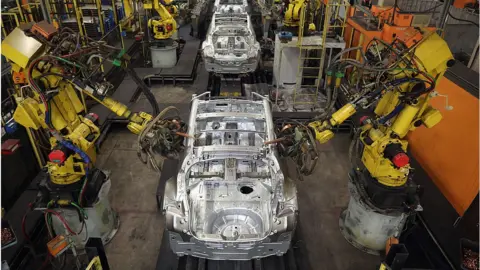 Getty Images
Getty Images"Automation is a growing field because it enables companies to reduce the requirement for labour," he said.
"If they have a task that needs carried out by say six individuals, then automation could potentially reduce that down to one.
"It is to fill the shortage of labour. The skills barometer in NI has indicated that there is a significant undersupply of labour.
"Automation and robotics will allow companies to continue to expand, because there is a labour shortage and engineers are filling that gap."
Last year Manufacturing NI warned that many businesses are struggling to recruit staff.
Automation is viewed by some as a way of addressing these shortages and other challenges.
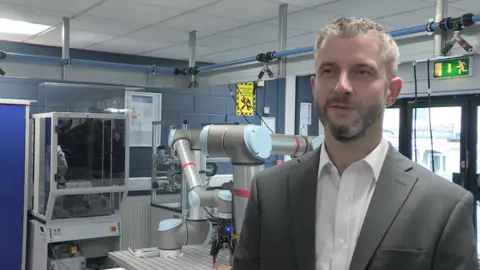
'Different skill level'
It's a view shared by James Fay of Newry-based pharmaceuticals firm Norbrook.
"We employ over 2,000 people at three sites in Newry," he said.
"Automation, depending on what industry you are in, is there to help people do their job better, to achieve consistent results. It's absolutely not to reduce people because, yes, there is a shortage of people in the industry with the skills that we need.
"We are in the pharmaceutical industry, which is highly regulated.
"Part of that means that we have to reduce our human intervention as we are manufacturing drugs. We have to have clean processes and to achieve that we need to have automated processes that help us reduce that human intervention.
"We are getting more machines to meet our demand and better machines to meet our demand and we also have a process where we have to replace our older machinery to meet our demand and to comply with the newer and developing regulations.
"We need to upskill people, we need people at a different skill level.
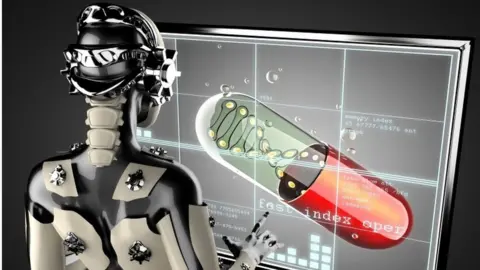 Getty Images
Getty Images"They'd be doing anything from the manufacturing of our products, to the transportation of the products, to the controlling of the environment that the products are manufactured in - air systems, temperature control, how we store our products.
"Everything that has an input can be controlled by automation."
And this growing demand is creating opportunities for young engineers developing their skills.
This month a number of apprentices from Southern Regional College will compete in the WorldSkills Competition where they will showcase their automation development skills.
Piqued an interest
Among them is John Doherty.
"I got in to it through school. We had a careers interview and it piqued an interest in me straight away," he said.
"I've always been interested in robotics, mechanics and how things work and it went from there really. From a young age building Lego, Meccano, all that stuff was right up my street.
"With work we are looking to get in welding robots and that's where I would like to see myself. Machines are so capable of doing so many tasks, the opportunity and the market is there."
In the student's Portadown workshop a mechanical arm rotates, finds, picks up and moves items, irrespective of where they are initially placed.
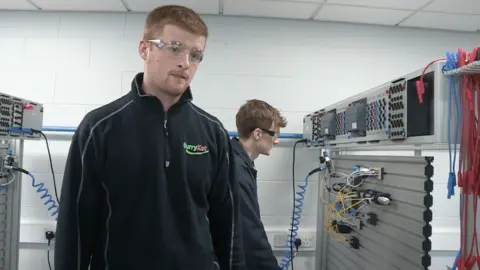
At one of the workstations, Philip Shirley is operating a pneumatic circuit.
"This is one of the pneumatics tasks in the WorldSkills competition," he said.
"This circuit isn't too complicated but you can range from really easy to really complicated depending on how many functions and steps you want to add it. In industry you can use pneumatics for everything. From moving boxes to making parts to welding. The whole lot."
Jamie Gibson would like to use his skills to control production lines.
"I was always interested in machines since I was young working on cars," he said.
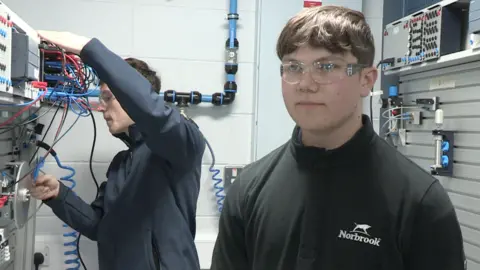
"I really enjoy the automation industry so would love to end up there."
According to Gary Mackin the number of students and businesses embracing automation is growing.
"Currently we have over 110 employed students on the qualification and over 60 engineering companies feeding into this.
"From SMEs to multi-nationals. Seasoned engineers looking to upskill in the newest technologies in the internet, embedded systems, programmable controllers. It's like any technology, it's constantly updating."
The National Finals of the WorldSkills competition take place this month.
